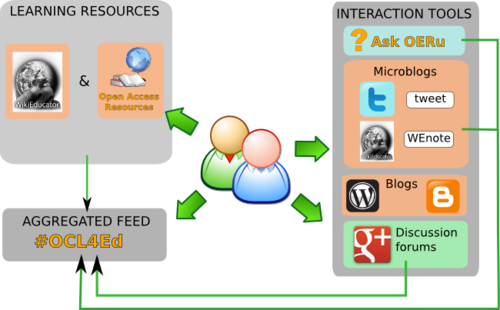Teaching approach
| Course dashboard for #OCL4Ed | |
|---|---|
| Course guide | Introduction & Aims | Course structure | Meet your facilitators | Teaching approach | Assessment and certification options | Course schedule | Resources | About OCL4Ed | FAQs | Statistics |
| Assignments | Assignment 1 |
Overview
Open content licensing for educators (OCL4Ed) is an open online course. You can participate for free and the course is based entirely on open educational resources so you don't need to purchase any prescribed texts for this course. The OCL4Ed course provides a number of participation, assessment and certification alternatives. You are free to choose how you want to participate in this course ranging from silent observer to memorably active participant.
The course is designed for guided self-study with opportunities for peer-support from your fellow participants and facilitators using microblog, blog and discussion forum posts.
The OERu free online courses usually attract hundreds of participants worldwide. Meet new friends and share your experiences. You will get the most from this course by sharing your thoughts, ideas and experiences with fellow participants by posting regularly via your microblog and the identified discussion forums. There are numerous prompts embedded in the course materials when to share ideas, or you can post whenever you like. All these interactions are automatically harvested in the course feed which you will find on the course dashboard.
A few things you should know about the OCL4Ed course
- Course tag: The course code for Open Content Licensing for Educators is: OCL4Ed. Write this down because you will use this tag for posting on Twitter, Google+ and your blog posts.
- Suggested study time: This is an asynchronous course which means you can participate at times which are convenient for your own schedule. The course is divided into 5 sessions. We have allocated 2 working days for each session. You should aim to spend approximately 1 to 1.5 hours per session at times which suite your own schedule. We estimate you will need about 10 hours of study time to complete the course. Learners participating in this course for formal academic credit will need to allocate additional time for the required E-Activities and final assignment. Formal assessment would require approximately 30 hours of additional learning effort.
- Receiving course instructions: If you registered for this course on WikiEducator and confirmed a valid email address, you will receive the course instructions for each session via email. If for any reason you are unable to access email or don't receive these course instructions, copies of the course announcements are posted on the course dashboard (Bookmark this page).
- International time zones: OERu courses typically register students across 24 time zones. You should study this course in your own time zone. For example, carry out the instructions for Tuesday on your Tuesday, not the time zone of your facilitators.
- Using social media technologies: If you are new to using social media technologies, we provide detailed tutorials and instructions to help you set up your own personal learning environment during the orientation session. We recommend that you establish your personal learning environment before the course commences. Blog's are optional, however, learners who are interested in an open badge, certificate of participation or formal assessment for course credit will need to create a personal course blog (or you can use your existing blog).
- Information overload: At times the aggregated feed can generate a large number of posts. You are not expected to read everything. Read what is current when you log in and follow the links which you find interesting. After a few days you will find participants with similar interests and you can then follow these posters in the feed.
- Learn by doing and sharing: Most of all, have fun! We are changing the world for the better by returning to the core value of sharing knowledge in education.
An overview of the OCL4Ed learning environment
The graphic below provides a visual representation of the different technologies used for OCL4Ed.
You should read and work through the self-study learning resources listed on the course dashboard. Share your thoughts and ideas with fellow learners using the interaction tools by posting on WEnotes, twitter or Google+ including our Google+ OCL4Ed community. Keep up to date by visiting the #OCL4Ed aggregated feed regularly which is also displayed on the course dashboard. The aggregated feed provides a succinct summary of all the relevant posts from the different interaction technologies. The graphic below provides a visual representation of the different technologies used for OCL4Ed.
The learning environment for the OCL4Ed online course uses three sources:
- Learning resources
- You can choose to work through the self study learning sequences listed on
- the course dashboard and
- Open access resources you find on the Internet
- The question and answer support forum called Ask OERu
- You can choose to work through the self study learning sequences listed on
- Interaction tools - You can post thoughts and interact with fellow students using:
- Microblog posts for short interactions including:
- For more detailed responses use:
- The Google+ OCL4Ed community (Remember to tag your posts using "#OCL4Ed") or
- Personal blog posts (a requirement for participants who will request formal assessment services). (Remember to tag or label your posts using the OCL4Ed).
- OCL4Ed Aggregated feed which generates a timeline of: microblog posts (WENotes & Twitter), discussion forum post in the Google+ OCL4Ed community, and support questions, answers, and comments from Ask Oeru. (This is an important resource for gaining an overview of what is happening in the course).

